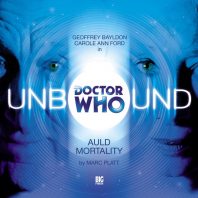
Released May 2003
In time for the fortieth anniversary of Doctor Who, Big Finish launched a new Unbound range to delve into the immensely intriguing territory of alternative casting and histories, not attempting in any way to step on established continuity but nonetheless offering glimpses of what could have been. Beginning with ‘Auld Mortality’ by Marc Platt, Geoffrey Bayldon steps into the role of the Doctor as a figure who never left Gallifrey and who has instead taken up writing as a recluse in a marble mausoleum deep beneath the Capitol.
Imagining a universe without the Doctor’s influence is a horrifying proposition, but rather than dwell on the innumerable injustices that would have been allowed to run rampant in this situation, ‘Auld Mortality’ instead focuses on the very intimate tale of a man hiding from his past and future as he writes himself into an observatory role as Hannibal prepares to cross the Alps. Fittingly, though he obsessively studies the reports from Gallifrey’s observatories, he has a far greater fascination with the constantly developing history of Earth compared to the stagnant state of his own world, and time and reality have lost meaning as he remains isolated with only his servant Badger as company after once considering taking a TARDIS to explore but ultimately losing the nerve to so go against his people and family in particular that either he disowned or was disowned by long ago.
Bayldon makes an instant impact in the role, sharing certain nuances with the original First Doctor as is only fitting but quickly instilling his own blend of tenderness, forlornness, and desperation that makes this man who so wants to be a part of something more a vivid and robust character in short order. He is an outsider and a rebel with his thoughts, and only one person in his family ever saw things remotely like him, and it’s through the emergence of his granddaughter Susan who has seeked him out that the Doctor is quickly brought back into the intrigue and politics of Gallifrey as she is ready to stand for the Presidency of the Supreme Council since he will not. There’s something quite unnerving but also remarkably exhilarating about this young woman who went down such a different trajectory on the television series talking about Gallifrey and the need for change so openly with her poised to become a candidate, and Carole Ann Ford easily steps back into her famous role with a needed shift in emphasis to bring this version of Susan to life so robustly in arguably her strongest performance yet.
The fact that the Doctor’s past has been haunting him through a familiar channel is incorporated into the narrative effortlessly, and the black-clad figure of Auld Mortality always lurking as a shadow near the President is an evocative image that intertwines with the Doctor’s own past and present sentiments about Gallifrey and running for office wonderfully. As fact and fiction blur and the presence of a TARDIS is questioned as simply being a literary conceit, the spectacle of Hannibal’s horde overrunning the Panopticon and the discovery that the Doctor has been living in a TARDIS for these many centuries while unknowingly kept captive help to craft an optimistic and emotionally satisfying conclusion that maintains a certain air of ambiguity. At the same time incorporating elements of his famed Lungbarrow into this affair, Parkin with ‘Auld Mortality’ delivers a stunning character piece that instantly epitomises just what this unique range is capable of by putting a unique spin on established characters and events as Hannibal’s search for the correct path mirrors the Doctor’s own.
- Release Date: 5/2003


Leave a Reply